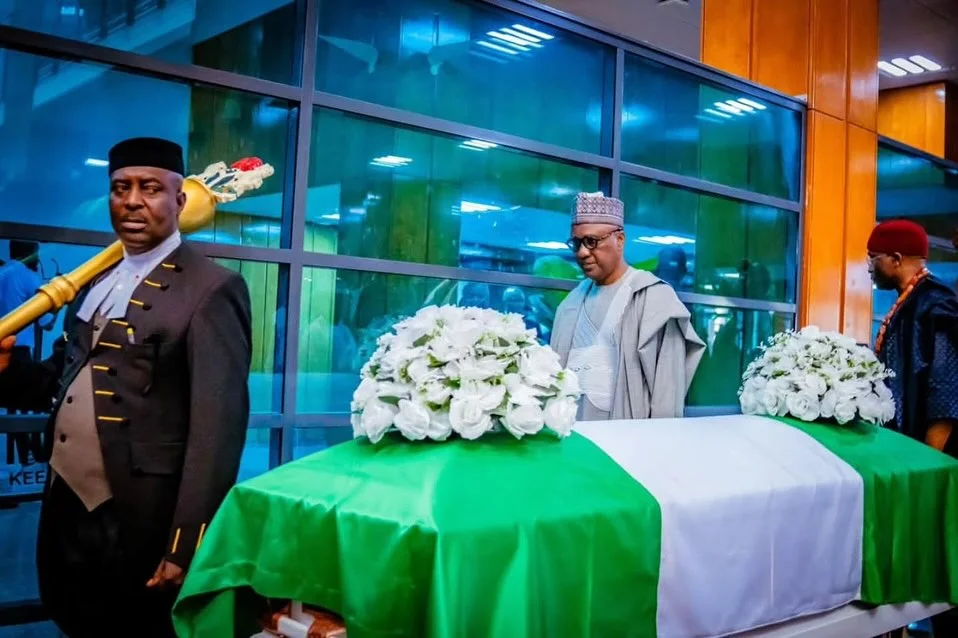551
By Tracy Moses
The House of Representatives, on Thursday, held a solemn valedictory session in honour of former Speaker of the House, Rt. Hon. Agunwa Anekwe, paying glowing tributes to his service and contributions to Nigeria’s democratic consolidation.
Speaker of the House, Rt. Hon. Tajudeen Abbas, who presided over the special session, announced that the House would immortalise all former presiding officers by naming halls within the National Assembly Complex after them.
Anekwe, who led the House between 1992 and 1993 during the Third Republic, was eulogised as a courageous and principled leader whose tenure strengthened legislative governance at a turbulent political period.
In his address, Speaker Abbas described the late Anekwe as an extraordinary parliamentarian whose legacy remains embedded in Nigeria’s democratic history.
“This honour goes beyond ceremony; it represents our nation’s acknowledgement of those who shaped the legislature through integrity rather than ambition,” Abbas said. “Rt. Hon. Agunwa Anekwe did not simply serve as Speaker, he embodied leadership marked by humility, discipline, and a sense of duty.”
The Speaker added that allowing Anekwe’s body to lie in state at the National Assembly was a mark of exceptional respect, reserved for leaders whose work profoundly shaped Nigeria’s democracy.
He recalled that Anekwe led with fairness and conviction at a time when the legislature operated under the shadow of military influence.
“He understood that the authority of the legislature lies not in its might, but in its responsible use,” Abbas noted. “He proved that even in political turbulence, order and institutional discipline can prevail.”
Also speaking, Senator Osita Izunaso, a former lawmaker and member of the National Burial Committee, described the late Speaker as a fearless defender of democracy during Nigeria’s most fragile political era.
“He stood his ground when the military dominated the executive arm while the National Assembly remained under civilian control,” Izunaso recalled. “Even after the November 17, 1993 coup, he was determined to reconvene the House. That resolve led to the immediate dissolution of the National Assembly.”
Izunaso added that Anekwe was instrumental in mobilising support for Chief M.K.O. Abiola during the June 12, 1993 presidential election, despite the risks involved.
“He fought for June 12 and the democratic mandate that came with it,” he said.
In his tribute, Senator Victor Umeh (Anambra Central) described Anekwe, who hailed from Adazi Ani in Anaocha Local Government Area of Anambra State, as a man of peace and integrity.
“He became Speaker at just 36, a gentleman politician never entangled in controversy,” Umeh said. “He built bridges across ethnic and political divides and pursued national unity with sincerity and moderation.”
Umeh also recounted Anekwe’s political contributions in Anambra State, particularly as interim chairman of the Action Congress (AC), which later evolved into the All Progressives Congress (APC).
“He nurtured the party with humility and laid a foundation that produced leaders after him,” Umeh added.
Lawmakers and former colleagues in attendance praised Anekwe for his intellect, moderation, and unwavering patriotism, describing him as a stabilising figure during an unstable time.
In his closing remarks, Speaker Abbas prayed that Anekwe’s life and example would inspire future generations of legislators.
“May history record that he served this nation with purpose and conviction,” Abbas said. “May his example continue to guide this House and all who cherish democracy.”
Anekwe, born in 1956, passed away at the age of 69. His remains are expected to be interred in his hometown in Anambra State after final national honours at the Assembly.
Representing the Senate President, Senator Muhammed Monguno also commended Anekwe’s courage in defending legislative independence during the military era.
“As Speaker, he stood against authoritarian decrees that sought to cripple the National Assembly’s powers,” Monguno recalled. “He rejected every attempt to undermine the legislature’s constitutional authority.”
He also narrated how Anekwe led a delegation to the 1993 Commonwealth Conference in Cyprus, where he publicly challenged the legitimacy of Chief Ernest Shonekan’s interim government.
“At that conference, we declared before the world that Chief Ernest Shonekan’s government was an imposition, and that the National Assembly held the true mandate of the Nigerian people,” Monguno said.
Former Speaker Yakubu Dogara, in his tribute, described Anekwe as “a dove with the heart of a lion,” praising his composure and bravery during a politically volatile era.
“He led the House when politics was short, tough, and perilous, yet he remained firm with wisdom and courage,” Dogara stated. “He will be remembered not for what he kept, but for what he gave, his service and his ideals.”
Deputy Speaker of the House, Rt. Hon. Benjamin Kalu, speaking on behalf of the leadership of the 10th House, said Anekwe’s service at a young age shaped Nigeria’s parliamentary values.
“At just 36, he carried the hopes of a young democracy,” Kalu said. “He saw politics as a calling, not a career. His devotion to democratic principles earned him the respect of colleagues and citizens alike.”
Kalu added that while institutions endure through time, it is men of integrity like Anekwe who give them meaning.
“We honour him by ensuring this House continues to uphold discipline, unity, and national interest,” he said.
The Deputy Speaker extended condolences to Anekwe’s family, the people of Anambra State, and Nigerians at large, praying for God’s comfort upon them.
Rt. Hon. Agunwa Anekwe, who made history as Nigeria’s youngest Speaker at 36, served from December 1992 until the military takeover of November 1993. His unwavering commitment to democratic ideals and legislative autonomy remains a lasting inspiration to generations of lawmakers.



